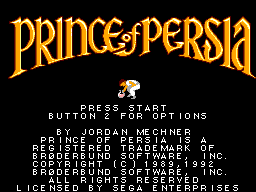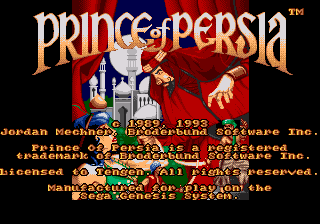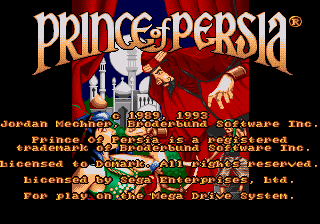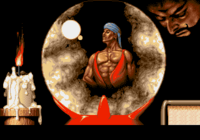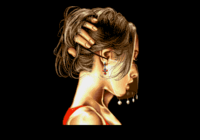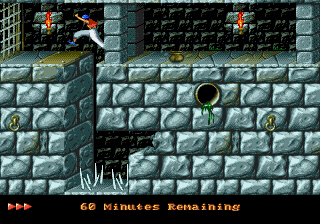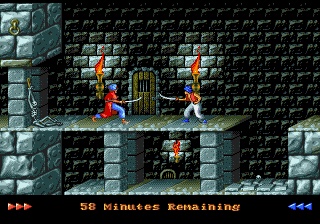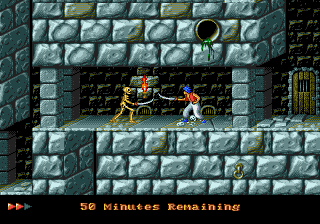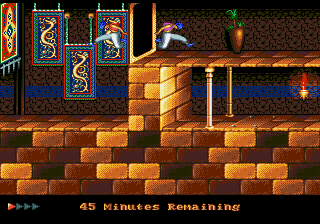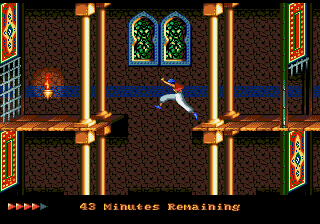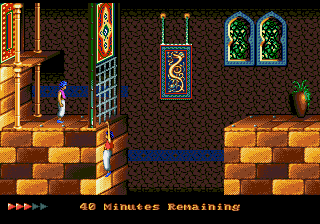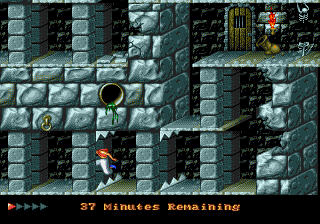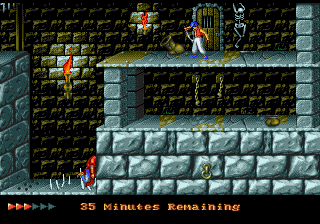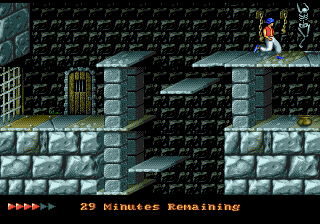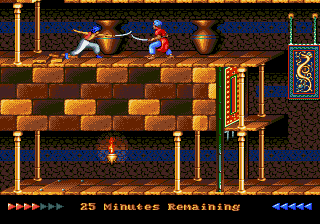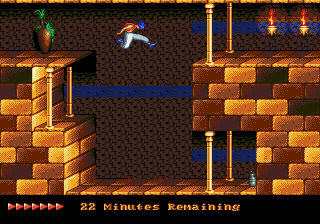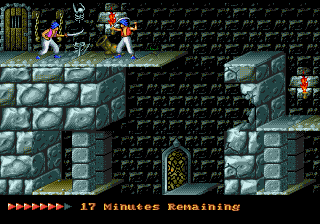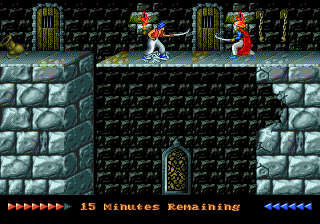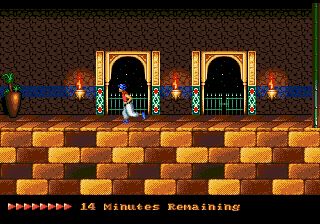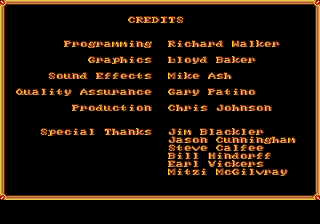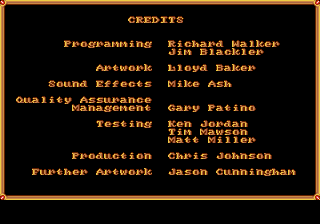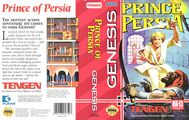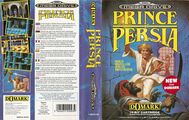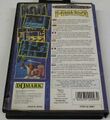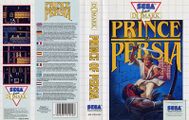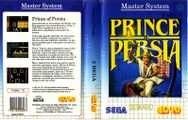Difference between revisions of "Prince of Persia"
From Sega Retro
m (wiki links) |
(European version) |
||
| Line 64: | Line 64: | ||
}} | }} | ||
}} | }} | ||
| − | '''''{{PAGENAME}}''''' is a cinematic platform game developed and published by [[Domark]]. The [[Sega Master System]] version was released in Europe in August 1992. It would later be ported to the [[Sega Game Gear]] the following month, and to the [[Sega Mega Drive]] in January 1994, with both ports being handled by original developer [[Domark]]. The game is a port of the | + | '''''{{PAGENAME}}''''' is a cinematic platform game developed and published by [[Domark]]. The [[Sega Master System]] version was released in Europe in August 1992. It would later be ported to the [[Sega Game Gear]] the following month, and to the [[Sega Mega Drive]] in January 1994, with both ports being handled by original developer [[Domark]]. The game is a port of the 1989 [[Brøderbund Software]] game ''[[wikipedia:Prince of Persia (1989 video game)|Prince of Persia]]''. |
==Story== | ==Story== | ||
| Line 71: | Line 71: | ||
==Gameplay== | ==Gameplay== | ||
| − | The game is a cinematic platformer, distinguished by the fluid, lifelike movements and relatively realistic physical limitations of its protagonist, the eponymous prince. Levels are composed of multiple screens with no scrolling in which the prince can move both horizontally and vertically. Gameplay requires problem solving and trial and error to overcome each obstacle. The objective is to lead the prince out of the dungeons and into a tower before time runs out. To do this, the prince must bypass many traps and fight hostile swordsmen. The | + | The game is a cinematic platformer, distinguished by the fluid, lifelike movements and relatively realistic physical limitations of its protagonist, the eponymous prince. Levels are composed of multiple screens with no scrolling in which the prince can move both horizontally and vertically. Gameplay requires problem solving and trial and error to overcome each obstacle. The objective is to lead the prince out of the dungeons and into a tower before time runs out. To do this, the prince must bypass many traps and fight hostile swordsmen. The player has 60 minutes (in real time) to complete the game. In each level, the prince must find the door that leads to the next level and figure out how to open it. |
The prince runs with {{left}} and {{right}}. He can tiptoe to step more carefully or position himself more precisely by holding {{A}} while moving. He can tiptoe safely through spike traps. He crouches with {{down}} and jumps directly upward with {{up}}. He leaps across a wide area with {{B}} while running, which can be used to traverse gaps. The player must press {{B}} a couple of steps before the edge to make the leap without running off the platform. When standing next to a ledge above him, he can jump and grab onto the ledge by holding {{up}}. If the ledge is below him, he can hang off of it by holding {{down}} when facing away from it. He can also grab ledges that he leaps onto from a running start by holding {{A}}. He picks up items with {{A}} and enters doorways with {{up}}. | The prince runs with {{left}} and {{right}}. He can tiptoe to step more carefully or position himself more precisely by holding {{A}} while moving. He can tiptoe safely through spike traps. He crouches with {{down}} and jumps directly upward with {{up}}. He leaps across a wide area with {{B}} while running, which can be used to traverse gaps. The player must press {{B}} a couple of steps before the edge to make the leap without running off the platform. When standing next to a ledge above him, he can jump and grab onto the ledge by holding {{up}}. If the ledge is below him, he can hang off of it by holding {{down}} when facing away from it. He can also grab ledges that he leaps onto from a running start by holding {{A}}. He picks up items with {{A}} and enters doorways with {{up}}. | ||
| Line 89: | Line 89: | ||
| bgcolor=#000 | | bgcolor=#000 | ||
| sprite={{sprite | Prince of Persia MD, Items.png | 2 | crop_width=12 | crop_height=22 | crop_x=0 | crop_y=0}} | | sprite={{sprite | Prince of Persia MD, Items.png | 2 | crop_width=12 | crop_height=22 | crop_x=0 | crop_y=0}} | ||
| − | | desc=Most potions heal the prince and restore one of his health points, but some potions poison the prince and cost a health point instead. Other potions permanently gives the prince another health point. | + | | desc=Most potions heal the prince and restore one of his health points, but some potions poison the prince and cost a health point instead. Other potions permanently gives the prince another health point. The European version of the game has potions that give the player more time to complete the game. |
}} | }} | ||
{{InfoRow | {{InfoRow | ||
| Line 100: | Line 100: | ||
===Levels=== | ===Levels=== | ||
| + | The European version of the game has four additional levels. | ||
{{InfoTable|imagewidths=320| | {{InfoTable|imagewidths=320| | ||
{{InfoRow | {{InfoRow | ||
| Line 175: | Line 176: | ||
==Versions== | ==Versions== | ||
| − | + | While all four versions of the game stem from the same source (Jordan Mechner's [[Apple II]] version, published by [[Brøderbund Software]] in 1989), each of the Sega versions were handled by different teams and arrived at different periods between 1992 and 1994. The original game was written in 6502 assembly language for the Apple II, meaning almost every version of the game had to be rewritten for the differing hardware. | |
| − | Domark's Richard Walker rewrote the game in [[68000]] assembly for the Mega Drive, using a version of the source code written in C as a base{{intref|Interview: Jim Blackler by Segacollection.com}} and the enhanced graphics of the [[Macintosh]] version. The levels were rebuilt by eye by playing the [[IBM PC]] version of the game, with a four extra levels created by Jim Blackler{{intref|Interview: Jim Blackler by Segacollection.com}}. | + | Despite having already appeared on the Mega-CD, the Mega Drive is completely different, with more detailed graphics and a different introduction sequence. Domark's Richard Walker rewrote the game in [[68000]] assembly for the Mega Drive, using a version of the source code written in C as a base{{intref|Interview: Jim Blackler by Segacollection.com}} and the enhanced graphics of the [[Macintosh]] version. The levels were rebuilt by eye by playing the [[IBM PC]] version of the game, with a four extra levels created by Jim Blackler{{intref|Interview: Jim Blackler by Segacollection.com}}. The North American version has no music during the levels, but the later European version adds an in-game score. The European version also has an additional animation of the prince falling down the stairs into the dungeon before the first level, four additional levels, and time-extending potions to accommodate the additional length. |
The Master System and Game Gear versions are largely identical bar differences in screen resolution, and, together with the Mega Drive version, were developed as contract work for [[Domark]]. The Game Gear version of the game runs in the system's Master System compatibility mode.{{ref|https://www.smspower.org/Tags/SMS-GG}} | The Master System and Game Gear versions are largely identical bar differences in screen resolution, and, together with the Mega Drive version, were developed as contract work for [[Domark]]. The Game Gear version of the game runs in the system's Master System compatibility mode.{{ref|https://www.smspower.org/Tags/SMS-GG}} | ||
| Line 204: | Line 205: | ||
*'''Further Artwork:''' Jason Cunningham | *'''Further Artwork:''' Jason Cunningham | ||
| source=In-game credits (EU) | | source=In-game credits (EU) | ||
| + | | pdf=Prince of Persia MD EU credits.png | ||
| console=MD | | console=MD | ||
}} | }} | ||
Revision as of 00:29, 15 February 2023
- For the Sega Mega-CD game, see Prince of Persia (Mega-CD).
| Prince of Persia | |||||||||||||||||||||||||||||||||||||||||||||||||||||||||||||||||
|---|---|---|---|---|---|---|---|---|---|---|---|---|---|---|---|---|---|---|---|---|---|---|---|---|---|---|---|---|---|---|---|---|---|---|---|---|---|---|---|---|---|---|---|---|---|---|---|---|---|---|---|---|---|---|---|---|---|---|---|---|---|---|---|---|---|
| System(s): Sega Mega Drive, Sega Master System, Sega Game Gear | |||||||||||||||||||||||||||||||||||||||||||||||||||||||||||||||||
| Publisher: Tengen (US) Domark (EU) Domark | |||||||||||||||||||||||||||||||||||||||||||||||||||||||||||||||||
| Developer: Domark | |||||||||||||||||||||||||||||||||||||||||||||||||||||||||||||||||
| Distributor: Tengen (US) | |||||||||||||||||||||||||||||||||||||||||||||||||||||||||||||||||
| Licensor: Brøderbund Software | |||||||||||||||||||||||||||||||||||||||||||||||||||||||||||||||||
| Original system(s): Apple II | |||||||||||||||||||||||||||||||||||||||||||||||||||||||||||||||||
| Sound driver: GEMS | |||||||||||||||||||||||||||||||||||||||||||||||||||||||||||||||||
| Genre: Action[1] | |||||||||||||||||||||||||||||||||||||||||||||||||||||||||||||||||
| Number of players: 1 | |||||||||||||||||||||||||||||||||||||||||||||||||||||||||||||||||
| |||||||||||||||||||||||||||||||||||||||||||||||||||||||||||||||||
|
Prince of Persia is a cinematic platform game developed and published by Domark. The Sega Master System version was released in Europe in August 1992. It would later be ported to the Sega Game Gear the following month, and to the Sega Mega Drive in January 1994, with both ports being handled by original developer Domark. The game is a port of the 1989 Brøderbund Software game Prince of Persia.
Contents
Story
The game is set in medieval Persia. While the good sultan is fighting a war in a foreign land, his vizier Jaffar, a wizard, seizes power. His only obstacle to the throne is the Sultan's daughter. Jaffar locks her in a tower and orders her to become his wife, or she would die within an hour. The game's unnamed protagonist, whom the Princess loves, is taken prisoner and thrown into the palace dungeons. In order to free her, he must escape the dungeons, get to the palace tower and defeat Jaffar before time runs out. In addition to guards, various traps and dungeons, the protagonist is further hindered by his own doppelgänger, conjured out of a magic mirror.
Gameplay
The game is a cinematic platformer, distinguished by the fluid, lifelike movements and relatively realistic physical limitations of its protagonist, the eponymous prince. Levels are composed of multiple screens with no scrolling in which the prince can move both horizontally and vertically. Gameplay requires problem solving and trial and error to overcome each obstacle. The objective is to lead the prince out of the dungeons and into a tower before time runs out. To do this, the prince must bypass many traps and fight hostile swordsmen. The player has 60 minutes (in real time) to complete the game. In each level, the prince must find the door that leads to the next level and figure out how to open it.
The prince runs with ![]() and
and ![]() . He can tiptoe to step more carefully or position himself more precisely by holding
. He can tiptoe to step more carefully or position himself more precisely by holding ![]() while moving. He can tiptoe safely through spike traps. He crouches with
while moving. He can tiptoe safely through spike traps. He crouches with ![]() and jumps directly upward with
and jumps directly upward with ![]() . He leaps across a wide area with
. He leaps across a wide area with ![]() while running, which can be used to traverse gaps. The player must press
while running, which can be used to traverse gaps. The player must press ![]() a couple of steps before the edge to make the leap without running off the platform. When standing next to a ledge above him, he can jump and grab onto the ledge by holding
a couple of steps before the edge to make the leap without running off the platform. When standing next to a ledge above him, he can jump and grab onto the ledge by holding ![]() . If the ledge is below him, he can hang off of it by holding
. If the ledge is below him, he can hang off of it by holding ![]() when facing away from it. He can also grab ledges that he leaps onto from a running start by holding
when facing away from it. He can also grab ledges that he leaps onto from a running start by holding ![]() . He picks up items with
. He picks up items with ![]() and enters doorways with
and enters doorways with ![]() .
.
The prince finds a scimitar in the dungeon, which he pulls out automatically when he encounters a swordsman. The player can manually retract his sword with ![]() and pull it back out with
and pull it back out with ![]() . While fighting, the prince attacks with
. While fighting, the prince attacks with ![]() and parries enemy attacks with
and parries enemy attacks with ![]() . The health points of enemy swordsmen are depicted by blue triangles. They lose a health point when they are attacked and die when they lose all of their health or if they are pushed into traps. The prince cannot proceed past a swordsman until he is defeated.
. The health points of enemy swordsmen are depicted by blue triangles. They lose a health point when they are attacked and die when they lose all of their health or if they are pushed into traps. The prince cannot proceed past a swordsman until he is defeated.
The prince has his health points indicated by red triangles, initially three. Each time he is damaged (being cut by a sword, falling from farther than one floor, or being hit by falling debris), he loses a health point. The prince can find potions in the dungeon that restore or cost health. There are also special potions that permanently increase his maximum health. The prince dies if he loses all of his health points, restarting from the beginning of the current level. The prince is killed instantly by some traps (spike traps and guillotines), by high falls, and by being attacked by a swordsman before he has his weapon out. While the prince has unlimited lives, the time limit continues to tick down for failed attempts, so the player eventually runs out of time to save the princess if not successful. The time remaining is always shown at the bottom of the screen during gameplay.
Some floor tiles act as switches and open or close gates or toggle traps. Standing on the tile activates the switch. Some ceiling tiles are loose and can be knocked down by jumping at them.
The player can open a menu by pausing the game with START to restart the level, but this does not gain any time back. The game uses passwords for continuing.
Items
| Potion | |
|---|---|
| Most potions heal the prince and restore one of his health points, but some potions poison the prince and cost a health point instead. Other potions permanently gives the prince another health point. The European version of the game has potions that give the player more time to complete the game. | |
| Scimitar | |
| Gives the prince a sword to use. Found in the first level. |
Levels
The European version of the game has four additional levels.
| Level 1 | |
|---|---|
| Level 2 | |
| Level 3 | |
| The skeletal swordsmen cannot be killed with the prince's sword but must be pushed into pits. | |
| Level 4 | |
| The prince must leap through a magic mirror, which creates his doppelgänger on the other side and drains his health to one point. | |
| Level 5 | |
| Level 6 | |
| Level 7 | |
| Level 8 | |
| The prince becomes trapped behind a closed gate near the end of this level, but a white mouse opens it from the other side. It is revealed that the princess sent the mouse. | |
| Level 9 | |
| Level 10 | |
| Level 11 | |
| Level 12 | |
| The prince faces his shadow doppelgänger. Injuring the doppelgänger injures the prince as well. To defeat him, the prince must sheathe his sword and merge back into him. The prince then runs across an invisible bridge to a new area, where he battles Jaffar. | |
| Level 13 | |
History
Legacy
The game was revolutionary at the time due to the quality of the animation, and is now considered a classic among gamers. It has also inspired several sequels, starting with Prince of Persia 2: The Shadow and the Flame, and a feature length movie.
Versions
While all four versions of the game stem from the same source (Jordan Mechner's Apple II version, published by Brøderbund Software in 1989), each of the Sega versions were handled by different teams and arrived at different periods between 1992 and 1994. The original game was written in 6502 assembly language for the Apple II, meaning almost every version of the game had to be rewritten for the differing hardware.
Despite having already appeared on the Mega-CD, the Mega Drive is completely different, with more detailed graphics and a different introduction sequence. Domark's Richard Walker rewrote the game in 68000 assembly for the Mega Drive, using a version of the source code written in C as a base[13] and the enhanced graphics of the Macintosh version. The levels were rebuilt by eye by playing the IBM PC version of the game, with a four extra levels created by Jim Blackler[13]. The North American version has no music during the levels, but the later European version adds an in-game score. The European version also has an additional animation of the prince falling down the stairs into the dungeon before the first level, four additional levels, and time-extending potions to accommodate the additional length.
The Master System and Game Gear versions are largely identical bar differences in screen resolution, and, together with the Mega Drive version, were developed as contract work for Domark. The Game Gear version of the game runs in the system's Master System compatibility mode.[14]
Production credits
Mega Drive version
- Programming: Richard Walker
- Graphics: Lloyd Baker
- Sound Effects: Mike Ash
- Quality Assurance: Gary Patino
- Production: Chris Johnson
- Special Thanks: Jim Blackler, Jason Cunningham, Steve Calfee, Bill Hindorff, Earl Vickers, Mitzi McGilvray
- Programming: Richard Walker, Jim Blackler
- Artwork: Lloyd Baker
- Sound Effects: Mike Ash
- Quality Assurance Management: Gary Patino
- Testing: Ken Jordan, Tim Mawson, Matt Miller
- Production: Chris Johnson
- Further Artwork: Jason Cunningham
Master System version
- Code: J. Tripp
- Music by: Matt Furniss
- Graphics: Matt Hicks, Saurav Sarkar
- Published by: Domark Software Ltd
Game Gear version
- Code: J. Tripp, K. Parker
- Music by: Matt Furniss
- Graphics: Matt Hicks, Saurav Sarkar
- Published by: Domark Group Ltd
Magazine articles
- Main article: Prince of Persia/Magazine articles.
Promotional material
- Main article: Prince of Persia/Promotional material.
Physical scans
Mega Drive version
| 77 | |
|---|---|
| Based on 36 reviews | |
| Mega Drive, SE (Rental) |
|---|
|
Master System version
| Sega Retro Average | ||||||||||||||||||||||||||||||||||||||||||||||||||||||||||||||||||||||||||||||||||||||||||||||||||||||||||||||||||||||||||||||||||||||
|---|---|---|---|---|---|---|---|---|---|---|---|---|---|---|---|---|---|---|---|---|---|---|---|---|---|---|---|---|---|---|---|---|---|---|---|---|---|---|---|---|---|---|---|---|---|---|---|---|---|---|---|---|---|---|---|---|---|---|---|---|---|---|---|---|---|---|---|---|---|---|---|---|---|---|---|---|---|---|---|---|---|---|---|---|---|---|---|---|---|---|---|---|---|---|---|---|---|---|---|---|---|---|---|---|---|---|---|---|---|---|---|---|---|---|---|---|---|---|---|---|---|---|---|---|---|---|---|---|---|---|---|---|---|---|
|
| 89 | |
|---|---|
| Based on 26 reviews | |
Game Gear version
| Sega Retro Average | ||||||||||||||||||||||||||||||||||||||||||||||||||||||||||||||||||||||||||||||||||||||||||||||||||||||||||||||||||
|---|---|---|---|---|---|---|---|---|---|---|---|---|---|---|---|---|---|---|---|---|---|---|---|---|---|---|---|---|---|---|---|---|---|---|---|---|---|---|---|---|---|---|---|---|---|---|---|---|---|---|---|---|---|---|---|---|---|---|---|---|---|---|---|---|---|---|---|---|---|---|---|---|---|---|---|---|---|---|---|---|---|---|---|---|---|---|---|---|---|---|---|---|---|---|---|---|---|---|---|---|---|---|---|---|---|---|---|---|---|---|---|---|---|---|
|
| 85 | |
|---|---|
| Based on 22 reviews | |
| Game Gear, PT |
|---|
|
Technical information
ROM dump status
| System | Hash | Size | Build Date | Source | Comments | |||||||||
|---|---|---|---|---|---|---|---|---|---|---|---|---|---|---|
| ? |
|
1MB | 1993-11 | Cartridge (US) | ||||||||||
| ? |
|
1MB | 1994-01 | Cartridge (EU) | ||||||||||
| ? |
|
256kB | Page | |||||||||||
| ? |
|
1MB | 1993-12 | Page | ||||||||||
| ? |
|
256kB | Cartridge (EU) | |||||||||||
| ? |
|
256kB | Cartridge (US/EU) | Master System ROM. Region code is set as "GG International". | ||||||||||
| ? |
|
256kB | EPROM cartridge | Master System ROM. Region code is set as "GG International". | Page |
References
NEC Retro has more information related to Prince of Persia
|
- ↑ File:PoP GG EU Box Back.jpg
- ↑ GamePro, "December 1993" (US; 1993-xx-xx), page 189
- ↑ 3.0 3.1 GamePro, "April 1994" (US; 1994-xx-xx), page 32
- ↑ Computer & Video Games, "March 1994" (UK; 1994-02-15), page 102
- ↑ 5.0 5.1 Sega Magazine, "March 1994" (UK; 1994-02-15), page 106
- ↑ Computer & Video Games, "July 1994" (UK; 1994-06-15), page 81
- ↑ 7.0 7.1 7.2 Computer Trade Weekly, "" (UK; 1992-09-28), page 6
- ↑ Sega Zone, "November 1992" (UK; 1992-10-28), page 76
- ↑ GamePro, "July 1992" (US; 1992-xx-xx), page 90
- ↑ 10.0 10.1 VideoGames & Computer Entertainment, "November 1992" (US; 1992-1x-xx), page 87
- ↑ Computer & Video Games, "October 1992" (UK; 1992-09-15), page 17
- ↑ 12.0 12.1 Computer & Video Games, "September 1992 (Go! Issue 11)" (UK; 1992-08-15), page 12
- ↑ 13.0 13.1 Interview: Jim Blackler by Segacollection.com
- ↑ https://www.smspower.org/Tags/SMS-GG
- ↑ File:Prince of Persia MD US credits.png
- ↑ File:Prince of Persia MD EU credits.png
- ↑ 1700 igr dlya Sega, "" (RU; 2001-xx-xx), page 181
- ↑ Console Mania, "Aprile 1994" (IT; 1994-0x-xx), page 80
- ↑ Cool Gamer, "9" (RU; 2002-10-13), page 164
- ↑ Computer & Video Games, "April 1994" (UK; 1994-03-15), page 36
- ↑ Electronic Games (1992-1995), "March 1994" (US; 1994-02-22), page 65
- ↑ Electronic Gaming Monthly, "March 1994" (US; 1994-xx-xx), page 38
- ↑ Entsiklopediya luchshikh igr Sega. Vypusk 1, "" (RU; 1999-xx-xx), page 350
- ↑ Entsiklopediya luchshikh igr Sega. Vypusk 2, "" (RU; 2000-xx-xx), page 178
- ↑ Gamers, "März/April 1994" (DE; 1994-03-04), page 48
- ↑ GamesMaster, "April 1994" (UK; 1994-03-17), page 70
- ↑ Hyper, "March 1994" (AU; 1994-xx-xx), page 60
- ↑ Joypad, "Mars 1994" (FR; 1994-0x-xx), page 80
- ↑ MAN!AC, "05/94" (DE; 1994-04-13), page 45
- ↑ Sega Mega Drive Advanced Gaming, "April 1994" (UK; 1994-xx-xx), page 18
- ↑ Mega, "March 1994" (UK; 1994-02-17), page 40
- ↑ Mega Action, "February 1994" (UK; 1994-01-28), page 12
- ↑ Mega Force, "Février 1994" (FR; 1994-0x-xx), page 112
- ↑ Mega Fun, "03/94" (DE; 1994-02-23), page 105
- ↑ MegaTech, "March 1994" (UK; 1994-02-20), page 66
- ↑ Mean Machines Sega, "April 1994" (UK; 1994-02-28), page 74
- ↑ Player One, "Mars 1994" (FR; 1994-0x-xx), page 88
- ↑ Play Time, "7/94" (DE; 1994-06-08), page 138
- ↑ Sega Magazin, "Juni 1994" (DE; 1994-05-11), page 18
- ↑ Sega Power, "April 1994" (UK; 1994-03-03), page 60
- ↑ Sega Pro, "April 1994" (UK; 1994-02-24), page 58
- ↑ Sega Zone, "March 1994" (UK; 1994-02-24), page 37
- ↑ SuperGamePower, "Abril 1994" (BR; 1994-0x-xx), page 72
- ↑ Sega Mega Drive Review, "1" (RU; 1995-04-03), page 116
- ↑ Sonic the Comic, "May 13th 1994" (UK; 1994-04-30), page 10
- ↑ Super Juegos, "Abril 1994" (ES; 1994-0x-xx), page 96
- ↑ Todo Sega, "Marzo 1994" (ES; 1994-0x-xx), page 90
- ↑ Tricks 16 bit, "Tricks Sega Gold 800 igr" (RU; 1998-03-20), page 139
- ↑ Video Games, "4/94" (DE; 1994-03-23), page 86
- ↑ VideoGames, "April 1994" (US; 1994-0x-xx), page 81
- ↑ Computer & Video Games, "July 1992" (UK; 1992-06-15), page 27
- ↑ Mean Machines: The Essential Sega Guide, "" (UK; 1993-11-18), page 150
- ↑ FX (UK) (+0:00)
- ↑ Game Mania, "May 1993" (UK; 1993-xx-xx), page 81
- ↑ Game Power, "Luigio/Agosto 1992" (IT; 1992-0x-xx), page 44
- ↑ GamesMaster (UK) "Series 2, episode 9" (1992-11-26, 24:00) (+6:14)
- ↑ Game Zone, "February 1992" (UK; 1992-01-24), page 20
- ↑ Hobby Consolas, "Octubre 1992" (ES; 1992-xx-xx), page 110
- ↑ Hobby Consolas, "Noviembre 1992" (ES; 1992-xx-xx), page 126
- ↑ Joypad, "Septembre 1992" (FR; 1992-0x-xx), page 80
- ↑ Joystick, "Septembre 1992" (FR; 1992-0x-xx), page 198
- ↑ Micromanía (segunda época), "Diciembre 1992" (ES; 1992-1x-xx), page 50
- ↑ Mean Machines, "July 1992" (UK; 1992-06-27), page 112
- ↑ Mean Machines Sega, "October 1992" (UK; 1992-09-xx), page 135
- ↑ Player One, "Novembre 1992" (FR; 1992-11-10), page 90
- ↑ Power Up!, "Saturday, October 24, 1992" (UK; 1992-10-24), page 1
- ↑ Sega Power, "July 1992" (UK; 1992-06-04), page 26
- ↑ Sega Pro, "July 1992" (UK; 1992-06-18), page 58
- ↑ Sega Pro, "Christmas 1992" (UK; 1992-12-10), page 69
- ↑ Sega Pro, "April 1993" (UK; 1993-03-11), page 72
- ↑ Sega Zone, "November 1992" (UK; 1992-10-28), page 74
- ↑ Sega Force, "2/92" (SE; 1992-11-19), page 23
- ↑ Sega Force, "July 1992" (UK; 1992-06-xx), page 12
- ↑ Sega Force, "June 1993" (UK; 1993-05-06), page 74
- ↑ Supersonic, "Novembre 1992" (FR; 1992-xx-xx), page 24
- ↑ Video Games, "8/92" (DE; 1992-07-22), page 95
- ↑ Consoles +, "Novembre 1992" (FR; 1992-1x-xx), page 148
- ↑ Electronic Games (1992-1995), "January 1993" (US; 1992-12-10), page 98
- ↑ Electronic Gaming Monthly, "January 1993" (US; 199x-xx-xx), page 38
- ↑ Mean Machines: The Essential Sega Guide, "" (UK; 1993-11-18), page 168
- ↑ Fistful!, "June/July 1992" (UK; 1992-05-28), page 7
- ↑ Game Mania, "May 1993" (UK; 1993-xx-xx), page 70
- ↑ Game Informer, "January/February 1993" (US; 199x-xx-xx), page 6
- ↑ Game Zone, "October 1992" (UK; 1992-09-24), page 58
- ↑ Joypad, "Janvier 1993" (FR; 199x-xx-xx), page 149
- ↑ Joystick, "Février 1993" (FR; 1993-0x-xx), page 185
- ↑ Micromanía (segunda época), "Marzo 1993" (ES; 1993-0x-xx), page 44
- ↑ Mean Machines Sega, "January 1993" (UK; 1992-12-28), page 96
- ↑ Play Time, "3/93" (DE; 1993-02-10), page 107
- ↑ Sega News, "Prosinec 1996" (CZ; 1996-1x-xx), page 32
- ↑ Sega Pro, "August 1992" (UK; 1992-07-16), page 66
- ↑ Sega Pro, "Christmas 1992" (UK; 1992-12-10), page 70
- ↑ Sega Pro, "April 1993" (UK; 1993-03-11), page 74
- ↑ Sega Force, "September 1992" (UK; 1992-08-13), page 56
- ↑ Video Games, "2/93" (DE; 1993-01-27), page 120
- ↑ Zero, "August 1992" (UK; 1992-07-xx), page 78
| Prince of Persia | |
|---|---|
|
Main page | Comparisons | Maps | Hidden content | Magazine articles | Video coverage | Reception | Promotional material | Region coding | Technical information | Bootlegs
Prototypes: Prototype
| |
| Prince of Persia games for Sega systems | |
|---|---|
| Prince of Persia (1992) | |
| Prince of Persia (1992) | |
| Prince of Persia (1992) | |
| Prince of Persia (1993) | Prince of Persia 2: The Shadow and the Flame (Cancelled) | |
| Prince of Persia: Arabian Nights (2000) | |
- 1 player games
- US Mega Drive games
- All US games
- EU Mega Drive games
- All EU games
- UK Mega Drive games
- All UK games
- SE Mega Drive games
- All SE games
- AU Mega Drive games
- All AU games
- Mega Drive games
- 1994 Mega Drive games
- All 1994 games
- Mega Drive action games
- All action games
- EU Master System games
- UK Master System games
- AU Master System games
- BR Master System games
- All BR games
- Master System games
- 1992 Master System games
- All 1992 games
- Master System action games
- US Game Gear games
- EU Game Gear games
- UK Game Gear games
- Game Gear games
- 1992 Game Gear games
- Game Gear action games
- All games
- Credits without reference
- Old-style rating (consolesplus)
- Update ratings template
- 1 old ratings
- Games with known prototypes
- Old technical information
- Prince of Persia
- Prince of Persia (franchise)
